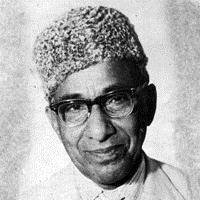Life about hafeez jalandari

Jalandhari was conceived in Jalandhar, Punjab, British India on 14 January 1900. His dad, Shams-ud-Din, was a Hafiz-e-Qur'an. Jullundhri at first concentrated in a mosque school and later joined a nearby school. He just got formal instruction until the seventh grade.
After the freedom of Pakistan in 1947, Jalandhari moved to Lahore in the new territory of Pakistan.[2]
Scholarly vocation
From 1922 to 1929, Jalandhari remained the manager of a couple of month to month magazines in particular, Nonehal, Hazar Dastaan, Teehzeeb-e-Niswan, and Makhzin. His first gathering of lyrics Nagma-e-Zar was distributed in 1935. After World War II, he functioned as the executive of the Song Publicity Department. Amid this same time he composed tunes that were tremendously preferred by the public.[3]
Jalandhari effectively took an interest in Pakistan Movement and utilized his compositions to motivate individuals for the reason for Pakistan. In mid 1948, he joined the powers for the opportunity of Kashmir and got injured. Jalandhari composed the Kashmiri Anthem, "Watan Hamara Azad Kashmir". He composed numerous enthusiastic tunes amid the Indo-Pakistani War of 1965.[1]
Jalandhari filled in as Director General of ethics in Pakistan Armed Forces, and afterward in an exceptionally unmistakable position as a counsel to the President, Field Marshal Mohammad Ayub Khan and furthermore a Director of Writers Guild of Pakistan.[1]
Jalandhari's work of verse, Shahnam-e-Islam, gave him mind blowing distinction which, in the way of Firdowsi's Shahnameh, is a record of the sublime history of Islam in verse. Jalandhari composed the national song of praise of Pakistan made by Ahmed Ghulamali Chagla otherwise called Ahmed G Chagla. He is one of a kind in Urdu verse for the charming tune of his voice and lilting rhythms of his melodies and verses. His verse for the most part manages sentimental, religious, energetic and common topics. He picked his topics, pictures and tunes from the subcontinent and his dialect was a fine mix of Hindi and Urdu word usage, mirroring the composite culture of South Asia.[1] One of his most well known ballad 'Abhi Toh Mein Jawan Hoon' was sung by Malika Pukhraj in the 1950s with music by the prestigious Pakistani music chief Master Inayat Hussain which is as yet famous among people in general in 2016.[4]
Marriage
Jalandhari wedded his cousin, Zeenat Begum, in 1917 at 17 years old. They had seven kids, all young ladies. In 1939, he took a youthful English lady of Lithuanian drop, Anela, as his second spouse. They had a little girl; the marriage finished in separate. His first spouse, Zeenat Begum, passed on in 1954. In 1955, Jalandhari wedded Khurshid Begum, with whom he had a daughter.[1]
Demise
Jalandhari passed on in Lahore, Pakistan, on 21 December 1982 at 82 years old. Covered in Model Town, Lahore, his remaining parts were later moved to a tomb worked by the Government of Pakistan close to the Minar-e-Pakistan in Lahore, the site of the Pakistan Resolution.